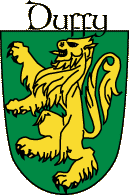|
 We are told by Dr. George F. Black in The
Surnames of Scotland that the name Macfie is 'one of the oldest and
most interesting personal names we possess'. Dr. Gillies adds in Place-names
of Argyllshire that 'Its plan and concept go far away beyond those
of even our old names'. The name Macfie derives from its older version
MacDuffie which is itself derived from the Gaelic "MacDubhSithe"
meaning 'Son of the Dark Fairy or Elf'. This stems from the tradition
that the Macfies had been in touch with the fairy folk that lived under
the hills and in many countries the remnants of the original bearers of
the name have been conferred with mystic powers. We are told by Dr. George F. Black in The
Surnames of Scotland that the name Macfie is 'one of the oldest and
most interesting personal names we possess'. Dr. Gillies adds in Place-names
of Argyllshire that 'Its plan and concept go far away beyond those
of even our old names'. The name Macfie derives from its older version
MacDuffie which is itself derived from the Gaelic "MacDubhSithe"
meaning 'Son of the Dark Fairy or Elf'. This stems from the tradition
that the Macfies had been in touch with the fairy folk that lived under
the hills and in many countries the remnants of the original bearers of
the name have been conferred with mystic powers.
Tradition asserts that the Macfies/MacDuffies
are descended from a Selkie or seal woman who cast off her fur to
become a beautiful woman and marrying the first Macfie who hid her fur
so that she could not return to the sea. Even in a country so steeped in
mystery and mysticism as Scotland, you would be very hard pressed indeed
to find a clan whose roots are so dark and mysterious.
The ancestral home of the Macfies is the
island of Colonsay, a small island about 2 miles by 10 miles among the
Inner Hebrides.
The Macfies were the hereditary keepers
of the records of the Isles. There is a tradition that one of the chiefs
of Colonsay fought and overcame Sire Gile de Argentine at the Battle of
Bannockburn in 1314, probably in support of the Lord of the Isles. The
McDonald annalist records that a MacDuffie of Colonsay was in the forces
of Donald Balloch when he raised a rebellion on behalf of the Lord of
the Isles in 1431.
The name of the MacDuffie chief in 1531
was Murroch and in 1609 Donald Macfie of Colonsay was one of the twelve
chiefs and gentlemen who met the Bishop of the Isles at Iona where, with
their consent, the celebrated 'Stautes of Icolmkill' were enacted.
|

